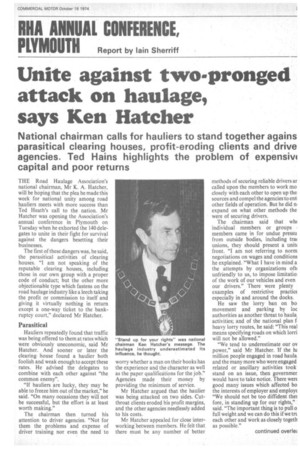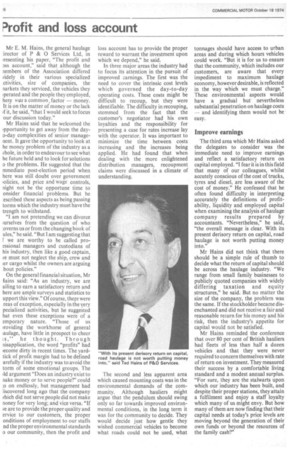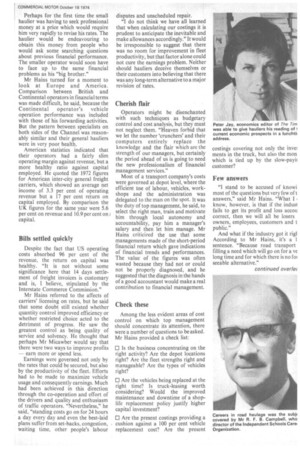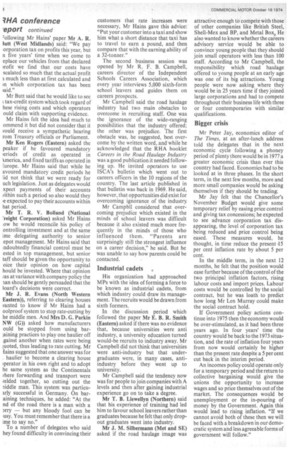Unite against two-pronged attack on haulage, says Ken Hatcher
Page 27

Page 28

Page 29

Page 30

If you've noticed an error in this article please click here to report it so we can fix it.
National chairman calls for hauliers to stand together agains parasitical clearing houses, profit-eroding clients and drive agencies. Ted Hains highlights the problem of expensivi capital and poor returns
THE Road Haulage Association's national chairman, Mr K. A. Hatcher, will be hoping that the plea he made this week for national unity among road hauliers meets with more success than Ted Heath's call to the nation. Mr Hatcher was opening the Association's annual conference in Plymouth on Tuesday when he exhorted the 140 delegates to unite in their fight for survival against the dangers besetting their businesses.
The first of these dangers was, he said, the parasitical activities of clearing houses. "I am not speaking of the reputable clearing houses, including those in our own group with a proper code of conduct; but the other more objectionable type which fastens on the road haulage industry like a leech taking the profit or commission to itself and giving it virtually nothing in return except a one-way ticket to the bankruptcy court," declared Mr Hatcher.
Parasitical
Hauliers repeatedly found that traffic was being offered to them at rates which were obviously uneconOmic, said Mr Hatcher. And sooner or later the clearing house found a haulier both foolish and weak enough to accept these rates. He advised the delegates to combine with each other against "the common enemy".
"If hauliers are lucky, they may he able to freeze him out of the market," he said. "On many occasions they will not be successful, but the effort is at least worth making."
The chairman then turned his attention to driver agencies. "Not for them the problems and expense of driver training nor even the need to worry whether a man on their books has the experience and the character as well as the paper qualifications for the job." Agencies made their money by providing the minimum of service.
Mr Hatcher argued that the haulier was being attacked on two sides. Cutthroat clients eroded his profit margins, and the other agencies needlessly added to his costs.
Mr Hatcher appealed for close interworking between members. He felt that there must be any number of better methods of securing reliable drivers ar called upon the members to work mo closely with each other to open up the. sources and compel the agencies to ent other fields of operation. But he did ni expand on what other methods the were of securing drivers.
The chairman said that wile individual members or groups members came in for undue pressu from outside bodies, including tra( unions, they should present a unit( front. "I am not referring to norm negotiations on wages and conditions he explained. "What I have in mind a the attempts by organizations oft( unfriendly to us, to impose limitatio: of the work of our vehicles and even our drivers." There were plenty examples of restrictive practice especially in and around the docks.
He saw the lorry ban on bo movement and parking by loc authorities as another threat to haula, activities; and of the national plan f heavy lorry routes, he said: "This real means specifying roads on which lorri will not be allowed."
"We tend to underestimate our ov power," said Mr Hatcher. If the hi million people engaged in road haula and the many more who were engaged related or ancillary activities took stand on an issue, then governmer would have to take notice. There were good many issues which affected ho the interests of employer and employt "We should not be too diffident thet fore, in standing up for our rights," said. "The important thing is to pull o full weight and we can do this if we trt each other and work as closely togetb as possible." Mr E. M. Hains, the general haulage irector of P & 0 Services Ltd, in !resenting his paper, "The profit and Dss account," said that although the aembers of the Association differed videly in their various specialized ctivities, size of companies, the aarkets they serviced, the vehicles they iperated and the people they employed, here was a common , factor — money. It is on the matter of money or the lack if it, he said, "that I would seek to focus our discussion today."
Mr Hains said that he welcomed the ipportunity to get away from the dayo-day complexities of senior managenent. It gave the opportunity to look at he money problem of the industry as a yhole, in order to endeavour to see what he future held and to look for solutions o the problems. He suggested that the rnmediate post-election period when here was still doubt over government lolicies, and price and wage controls, night not he the opportune time to onsider financial problems. But he escribed these aspects as being passing torms which the industry must have the trength to withstand.
"I am not pretending we can divorce lurselves from the question of who ,overns us or from the changing book of ides," he said. "But I am suggesting that f we are worthy to be called proessional managers and custodians of his industry, then like a good captain, ye must not neglect the ship, crew and Ler cargo whilst the owners are arguing bout policies."
On the general financial situation, Mr Iains said: "As an industry, we are ailing to earn a satisfactory return and here are ample surveys and statistics to upport this view." Of course, there were reas of exception, especially in the very pecialized activities, but he suggested hat even these exceptions were of a emporary nature. "Those of us iroviding the workhorse of general iaulage, have little in prospect to cheer Ls," he thought. Through aisapplication, the word "profits" had ecome dirty in recent times. The yardtick of profit margin had to be defined arefully if the industry was to avoid the torm of some emotional groups. The lid argument "Does an industry exist to nake money or to serve people?" could ,o on endlessly, but management had !iscovered long ago that the company yhich did not serve people did not make noney for very long; and vice versa. "If ye are to provide the proper quality and ervice to our customers, the proper onditions of employment to our staffs nd the proper environmental standards o our community, then the profit and loss account has to provide the proper reward to warrant the investment upon which we depend," he said.
In three major areas the industry had to focus its attention in the pursuit of improved earnings. The first was the need to cover the intrinsic cost levels which governed the day-to-day operating costs. These costs might be difficult to recoup, but they were identifiable. The difficulty in recouping, stemmed from the fact that the customer's negotiator had his own loyalties and the responsibility for presenting a case for rates increase lay with the operator. It was important to minimize the time between costs increasing and the increases being applied. He had found that when dealing with the more enlightened distribution managers, recoupment claims were discussed in a climate of understanding.
The second and less apparent area which caused mounting costs was in the environmental demands of the cornmunity. Although hauliers might argue that the pendulum should swing only so far towards improved environmental conditions, in the long term it was for the community to decide. They would decide just how gentle they wished commercial vehicles to become what roads could not be used, what tonnages should have access to urban areas and during which hours vehicles could work. "But it is for us to ensure that the community, which includes our customers, are aware that every impediment to maximum haulage economy, however desirable, is reflected in the way which we must charge." These environmental aspects would have a gradual but nevertheless substantial penetration on haulage costs — and identifying them would not be easy.
Improve earnings
The third area which Mr Hains asked the delegates to consider was the immediate need to improve earnings and reflect a satisfactory return on capital employed. "I fear it is in this field that many of our colleagues, whilst aceutely conscious of the cost of trucks, tyres and diesel, are less aware of the cost of money." He confessed that he often found difficulty in interpreting accurately the definitions of profitability, liquidity and employed capital when examining the analysis of haulage company results prepared by accountants. "Nevertheless," he said, "the overall message is clear. With its present derisory return on capital, road haulage is not worth putting money into."
Mr Hains did not think that there should be a simple rule of thumb to decide what the return of capital should be across the haulage industry. "We range from small family businesses to publicly quoted companies with widely differing taxation and equity structures," he said. But no matter the size of the company, the problem was the same. If the stockholder became disenchanted and did not receive a fair and reasonable return for his money and his risk, then the industry's appetite for capital would not be satisfied.
Mr Hains reminded the conference that over 80 per cent of British hauliers had fleets of less than half a dozen vehicles and that they were never required to concern themselves with rate of return on investment. They measured their success by a comfortable living standard and a modest annual surplus. "For sure, they are the stalwarts upon which our industry has been built, and despite their proper stations, they attain a fulfilment and enjoy a staff loyalty which many of us might envy. But how many of them are now finding that their capital needs at today's price levels are moving beyond the generation of their own funds or beyond the resources of the family cash?" Perhaps for the first time the small haulier was having to seek professional money at a price which would require him very rapidly to revise his rates. The haulier would be endeavouring to obtain this money from people who would ask some searching questions about previous financial performance. The smaller operator would soon have to face up to the same financial problems as his "big brother."
Mr Hains turned for a moment to look at Europe and America. Comparison between British and Continental operators in financial terms was made difficult, he said, because the Continental operator's vehicle operation performance was included with those of his forwarding activities. But the pattern between specialists on both sides of the Channel was reasonably similar and their general hauliers were in very poor health.
American statistics indicated that their operators had a fairly slim operating margin against revenue; but a more healthy ratio against capital employed. He quoted the 1972 figures for American inter-city general freight carriers, which showed an average net income of 3.3 per cent of operating revenue but a 17 per cent return on capital employed. By comparison the UK figures for the same year were 5.6 per cent on revenue and 10.9 per cent on 4 capital.
Bills settled quickly
Despite the fact that US operating costs absorbed 96 per cent of the revenue, the return on capital was healthy. "It is not without some significance here that 14 days settlement of freight invoices is customary and is, I believe, stipulated by the Interstate Commerce Commission."
Mr Haim referred to the affects of carriers' licensing on rates, but he said that some doubt still existed whether quantity control improved efficiency or whether restricted choice acted to the detriment of progress. He saw the greatest control as being quality of service and solvency. He thought that perhaps Mr Micawber would say that there were two ways to improve profits earn more or spend less.
Earnings were governed not only by the rates that could be secured, but also by the productivity of the fleet. Efforts had to be made to maximize vehicle usage and consequently earnings. Much had been achieved in this direction through the co-operation and effort of the drivers and quality and enthusiasm of traffic operators. "Nevertheless," he said, "standing costs go on for 24 hours a day every day and even the best-laid plans suffer from set-backs, congestion, waiting time, other people's labour disputes and unscheduled repair.
"I do not think we have all learned that when calculating OUT costings it is prudent to anticipate the inevitable and make allowances accordingly." It would be irresponsible to suggest that there was no room for improvement in fleet productivity, but that factor alone could not cure the earnings problem. Neither should hauliers deceive themselves or their customers into believing that there was any long-term alternative to a major revision of rates.
Cherish flair
Operators might be disenchanted with such techniques as budgetary control and cost analysis, but they must not neglect them. "Heaven forbid that we let the number `crunchers' and their computers entirely replace the knowledge and the flair which are the strength of our managers, but certainly the period ahead of us is going to need the new professionalism of financial management services."
Most of a transport company's costs were governed at depot level, where the efficient Use of labour, vehicles, workshops and the administration was delegated to the man on the spot. It was the duty of top management, he said, to select the right man, train and motivate him through local autonomy and accountability, pay him a manager's salary and then let him manage. Mr Hains criticized the use that some managements made of the short-period financial return which gave indications of financial trends and performances. The value of the figures was often wasted because they had not or could not be properly diagnosed, and he suggested that the diagnosis in the hands of a good accountant would make a real contribution to financial management.
Check these
Among the less evident areas of cost control on which top management should concentrate its attention, there were a number of questions to be asked. Mr Hains provided a check list: O Is the business concentrating on the right activity? Are the depot locations right? Are the fleet strengths right and manageable? Are the types of vehicles right?
El Are the vehicles being replaced at the right time? Is truck-leasing worth considering? Would the improved maintenance and downtime of a shoplife replacement policy justify higher capital investment?
El Are the present costings providing a cushion against a 100 per cent vehicle replacement cost? Are the present costings covering not only the invel merits in the truck, but also the mon which is tied up by the slow-payii customer?
Few answers
"I stand to be accused of knowi most of the questions but very few oft answers," said Mr Hains. "What I know, however, is that if the indust fails to get its profit and loss aecou correct, then we will all be losers owners, employees, customers and t public."
And what if the industry got it rig' According to Mr Hains, it's a 1 sentence. "Because road transport filling a need which will go on for a ye long time and for which there is no foi seeable alternative." 7o1lowing Mr Haim' paper Mr A. R. hitt (West Midlands) said: "We pay ,orporation tax on profits this year, but n five years' time when we come to eplace our vehicles from that declared irofit we find that our costs have scalated so much that the actual profit s much less than at first calculated and In which corporation tax has been mid."
Mr Butt said that he would like to see tax-credit system which took regard of hese rising costs and which operators ould claim with supporting evidence. Mr Hains felt the idea had much to ommend it but did not consider that it vould receive a sympathetic hearing rom Treasury officials or Parliament. Mr Ken Rogers (Eastern) asked the peaker if he favoured mandatory eriods of credit as operated in rnerica, and fixed tariffs as operated in tirope. Mr Hains said that while he avoured mandatory credit periods he lid not think that we were ready for uch legislation. Just as delegates would xpect payments of their accounts vithin such a period so also would they le expected to pay their accounts within hat period.
Mr T. R. V. Bolland (National 'reight Corporation) asked Mr Hains ow he would reconcile his policy of ontrolling investment and at the same [me delegating authority to senior epot management. Mr Hains said that ,ndoubtedly financial control must be ested in top management, but senior taff should be given the opportunity to oice their opinion on how capital hould be invested. Where that opinion tas at variance with company policy the an should be gently persuaded that the loard's decisions were correct.
Mr J. R. Evans (North Western Eastern)), referring to clearing houses vanted to know if Mr Haim had a oolproof system to stop rate-cutting by he middle men. And Mrs D. G. Parkin NW (G)) asked how manufacturers ould be stopped from using bar;aining practices to play one haulier off .gainst another when rates were being tuoted, thus leading to rate cutting. Mr ains suggested that one answer was for . haulier to become a clearing house • perator in his own right and to adopt he same system as the Continentals there forwarding and transport were telded together, so cutting out the riddle man. This system was particuirly successful in Germany. On baraining techniques, he added: "At the nd of the road there is a man with a 3rry — but any bloody fool can be ,usy. You must remember that there is a he to say no." To a number of delegates who said hey found difficulty in convincing their customers that rate increases were necessary, Mr HaMs gave this advice: "Put your customer into a taxi and show him what a short distance that taxi has to travel to earn a pound, and then compare that with the earning ability of a 32-tonner."
The second business session was opened by Mr R. F. B. Campbell, careers director of the Independent Schools Careers Association, which every year interviews 5,000 sixth-form school leavers and guides them on careers prospects.
Mr Campbell said the road haulage industry had two main obstacles to overcome in recruiting staff. One was the ignorance of the wide-ranging possibilities that the industry offered; the other was prejudice. The first obstacle was, he suggested, best overcome by the written word, and' while he acknowledged that the RHA booklet Careers in the Road Haulage Industry was a good publication it needed following up. He invited operators to use ISCA's bulletin which went out to careers officers in the 10 regions of the country. The last article published in that bulletin was back in 1969. He said, however, that opportunities did exist for overcoming ignorance of the industry.
Mr Campbll considered that overcoming prejudice which existed in the minds of school leavers was difficult because it also existed much more frequently in the minds of those who influenced them. "Parents are surprisingly still the strongest influence on a career decision," he said. But he was unable to say how parents could be contacted.
Industrial cadets
His organization had approached MPs with the idea of forming a force to be known as industrial cadets, from which industry could draw its management. The recruits would be drawn from sixth formers.
In the discussion period which followed the paper Mr E. B. R. Smith (Eastern) asked if there was no evidence that, because universities were anti industry, a university education turned would-be recruits to industry away. Mr Campbell did not think that universities were anti-industry but that undergraduates were, in many cases, antiindustry before they went up to university.
Mr Campbell said the tendency now was for people to join companies with A levels and then after gaining industrial experience go on to take a degree.
Mr T. B. Llewellyn (Northern) said that his experience of training had led him to favour school leavers rather than graduates because he felt that only dropout graduates went into industry.
Mr J. M. Silbermann (Met and SE) asked if the road haulage image was attractive enough to compete with those of other companies like British Steel, Shell-Mex and BP, and Metal Box,, He also wanted to know whether the careers advisory service would be able to convince young people that they should join small operators with less than 100 staff. According to Mr Campbell, the responsibility which road haulage offered to young people at an early age was one of its big attractions. Young people were now asking where they would be in 25 years time if they joined large corporations and had to compete throughout their business life with three or four contemporaries with similar qualifications.
Bigger crisis
Mr Peter Jay, economics editor of The Times, at an after-lunch address told the delegates that in the next economic cycle following a phoney period of plenty there would be in 1977 a greater economic crisis than ever this country had faced. Economics had to be looked at in three phases. In the short term, in the next few months, more and more small companies would be asking themselves if they should be trading.
Mr Jay felt that the Chancellor's November Budget would give some temporary relief by easing price control and giving tax concessions; he expected to see advance corporation tax disappearing, the level of corporation tax being reduced and price control being eased. These measures would, he thought, in time reduce the present -15 per cent inflation rate by about 5 per cent.
In the middle term, in the next 12 months, he felt that the position would ease further because of the control of the two principal inflation factors, rising labour costs and import prices. Labour costs would be controlled by the social contract, but he was loath to predict how long Mr Len Murray could make the social contract hold.
If Government policy actions continue into 1975 then the economy would be over-stimulated, as it had been three years ago. In four years' time the country would be back to the 1973 situation, and the rate of inflation four years from now would certainly be higher than the present rate despite a 5 per cent cut back in the interim period.
An incomes policy could operate only for a temporary period and the return to collective bargaining would give the unions the opportunity to increase wages and so price themselves out of the market. The consequences would be unemployment or the in-pouring of money by the Government. Again this would lead to rising inflation. "If we cannot avoid both of these then we will be faced with a breakdown in our democratic system and less agreeable forms of government will follow."




































































































